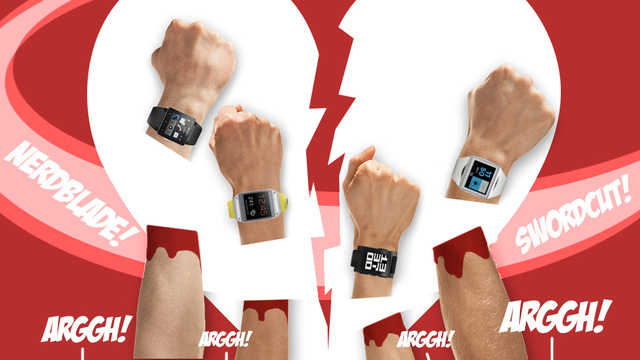I don’t want a smartwatch. I don’t, and will not. Because the very idea of a smartwatch, even at its platonic ideal, is damn useless. Let me explain.
Basically, a smartwatch, even a great one (which does not exist) is like NFC — the “futuristic” technology that lets you pay for things by tapping your phone against something instead of swiping your credit card, and which has never really caught on. Like NFC, the smartwatch concept is a Rube Goldberg solution to a problem so small that it is solved by reaching into your pocket. And solutions to small problems work best when they’re little ineffable features, not entire products or platforms.
One of the core issues with the concept of NFC, or at least how it is being implemented, is that it does not really free you from anything. It just does the same things, with slightly more hassle and risk of battery failure, as a credit card or cash. A credit card which you still have to carry around, because not everyone is going to accept NFC. The convenience of having your payments consolidated onto your phone was outstripped and undermined by several payment companies consolidating your payment data the way the NFC wallet was originally supposed to, leaving it with just the gimmick of tapping your phone to pay. And that’s nothing more than technologically decadent lateral movement.
The smartwatch is even worse. Its features are inferiorities instead of parallels. Everything it does is a thing a smartphone does, just a little worse, and with a little less refined an interface, and with another battery you need to worry about, and as a fashion constant, an accessory that needs to be worn prominently in order to be useful. These aren’t death knells for a product that does something deeply useful, but they are for one with ambitions so narrow as the smartphone.
Let’s go back to NFC, or actually, its progenitor, the credit card. The reason that the credit card became no less than one of the greatest technological standards in history is that it solved a real world problem. You wouldn’t have to run to the bank by 5PM to get cash, or risk running short after a few rounds too many at dinner and running home for more, leaving your jacket as collateral. You could just pay up, like magic, or like a proto-cloud payment structure. It fundamentally changed the way you paid for things.
Now look at all the products that changed how people use stuff, the ones that actually caught on and changed the tech landscape like the smartwatch would have to if it were to become a viable product category. They also solved things. The Walkman made music portable. The iPod made that portability comprehensive with the iTunes store, after other MP3 players failed to recognise that it wasn’t just capacity, but organisation (let’s not even talk about the MiniDisc). Cell phones took communication out into the world, and smartphones adapted for the ways that communication changed in the digital age. (The same holds true for software and platforms, like Facebook and Dropbox, to a lesser degree.)
In comparison, a smartwatch is a trinket, a toy that augments a product that already exists in a superflous way. It’s more MiniDisc than it is iPod, or even Zune. And yes, the shifts in technology are always subtle, and sometimes we don’t know what we really want until we see it done right, not just done for the hell of it. Steam and the iPod are examples of that. But again, this compulsion is a personal one, held by those wonderful nerds who physically require constant information stimulation to be at peace. That is not (yet, at least) the way that most other human beings want to exist. And there just isn’t enough upside in this version of the idea of a smartwatch.
(Without touching too heavily on it, since it’s a matter of culture and preference instead of pure technology, I’d say maybe the “always need to know exactly what my alerts are” compulsion is tied to the very specific job we do here. We need to know about breaking news, and it’s a problem if we don’t. Sure, a smartwatch would help with that, and it would help a doctor or maybe an EMT, or people in a handful of other situations, like a parent with a sick kid. But only them. For everyone else, the broad utility of constant, immediate access is an impressive feature, but maybe just noise.)
Maybe a generation or five down the road, chips will be good enough to power something really special. Maybe the Glass geolocating, alerting, life-capturing model can co-exist as both on-face apps and wrist-mounted ones (which could add biometric data as well), growing a combined ecosystem that can grow the two together, along with anything else we come up with — maybe pendant-like screens, like the apparats from Super Sad True Love Story. Maybe something else we can’t even imagine will be irresistibly wonderful, and find its way into a smartwatch, and I’ll print this comment out and eat it. But whatever that is, it will have a to be so staggeringly wonderful to make me not even consider just reaching into my pocket and using my phone.
